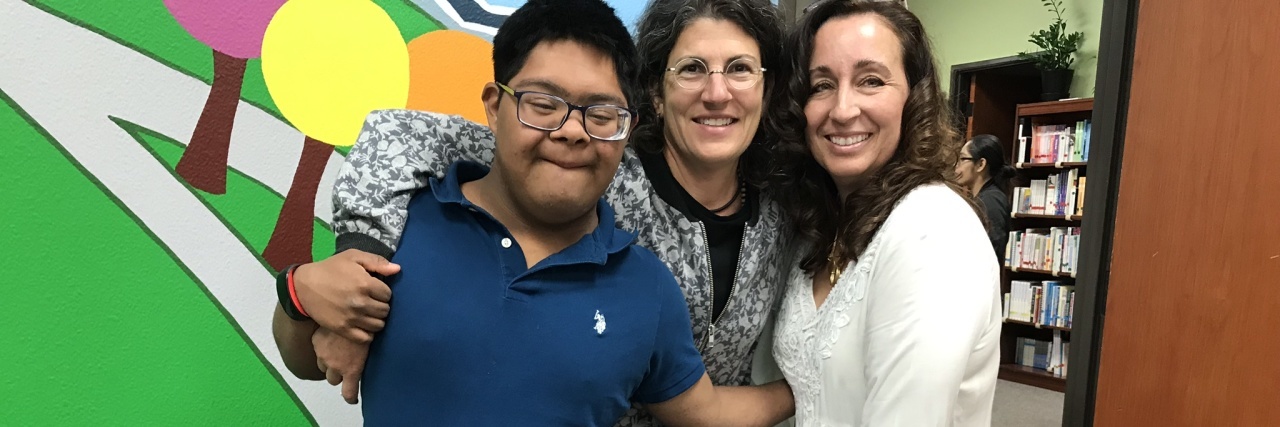To the Doctor With Low Expectations for My Son With Down Syndrome
Dear Doctor,
It is the morning after our testing with you at the clinic yesterday, and I feel obligated to write to you about some of my takeaways from yesterday’s meeting. I know you don’t know us, and I know you don’t know my son, but I would like to speak to some of your language and biases that became apparent during our meeting and the phone calls after.
We actually wrote a book called “Fully Included — Stories to Inspire Inclusion.” So your words about putting him in a life skills class really hit home with me. I didn’t have the time or energy to discuss this at length with you. I chose to let it go at that time, but in your phone call after, you brought it up several times, telling me your thoughts.
Here are mine:
Please know this — we have always chosen a “research-proven optimal learning environment.” It’s called being fully included. Research has proven over and over again that a segregated classroom actually has negative effects. We feel very strongly that in order for my son to get a job, go to college and live independently, he needs people skills. He cannot learn those customer service skills/people skills while he is in a segregated classroom with other individuals who are language delayed.
He needs to be with the general education population of students, so he can gain their rich language, their social cues, and become comfortable around them. And those other students need to be around him and get to know him as well. It has always been a focus for us and will continue to be. We feel strongly that inclusion is why my son is as advanced as he is, and why his adaptive skills are so strong.
Here is a link to our book. Please note the resource section contains links to several studies speaking to how inclusion works, as well as an article called “The Negative Effects of Segregation.”
We also spoke in general about IQ testing. Any IQ test represents one day, out of one week, out of one month, out of a year. It’s just a teeny tiny glimpse of him, and you are a stranger. He told you yesterday that he had hot dogs for lunch, and you seemed surprised, but seemed to believe him. We did not have hot dogs for lunch yesterday. See, my son has a wicked sense of humor, and so do many other kids with Down syndrome. They use laughter and deflection to give themselves more time to answer and grasp the question — using adaptive skills! These skills are not calculated into an IQ test.
IQ testing is biased and inaccurate, especially for those with learning disabilities. Scores are widely inaccurate and quite useless for many individuals with ID/IDD. We choose to concentrate on finding a person’s strengths and talents, and grow from there. We choose to be strength-based, and concentrate on what a person can do vs. what they cannot do.
The other topic I wanted to bring up was guardianship. You suggested guardianship for my son, which should be considered out of your scope of knowledge. I feel strongly that it is not your place to be commenting on or giving legal advice.
Guardianship vs. power of attorney is a hot topic in our community right now. We always suggest that the least restrictive environment (or LRE) is applied in any situation. We will not be taking guardianship from our son, nor will we be taking away his rights to vote or to marry. This is a big deal, and I am not sure you see the bigger picture. Guardianship cannot be reversed easily; it’s almost impossible.
Please read the story of Jenny Hatch, who fought and overcame the limitations her parents and living facility put on her and her lifestyle. She won, but it took over three years for her to regain her right to make her own decisions, to vote and live her own life. As parents, we take this very seriously. You suggested he will need help — he absolutely will! But power of attorney can cover the things he needs help with, including financial help and health issues.
Our vision for our son is crystal clear. He should be included in life.
He has value.
He is super smart — in things that are meaningful and relevant to him.
I feel like you are behind on some of the newer standards and would like to bring awareness to these issues.
We all live in one world, and as such my child — all children — should be given every opportunity to be included as part of the community and in their schools. They grow the most and reach their potential when the standards are high and they are included with others.
I thank you for your time and hope what I’ve written brings awareness to you.

